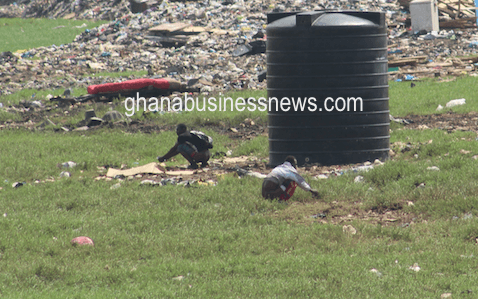Five million Ghanaians still practise open defecation
 A call has been made to journalists in Ghana to help improve and sustain public access to safe water as well as hygienic sanitation facilities in the country.
A call has been made to journalists in Ghana to help improve and sustain public access to safe water as well as hygienic sanitation facilities in the country.
The call was made at a training workshop organised for members of the Ghana Wash Journalists Network (GWJN).
The one-day event, which brought media practitioners from across the country to Dodowa in the national capital Accra, revolved around the Sustainable Development Goals (SDGs) to which Ghana subscribed in September 2015. It was themed: “Building a strong media coalition for effective WASH advocacy”.
The forum touched on the SDGs and highlighted the fact that, with eight years left for the goals to be achieved by the 2030 deadline, more efforts were still needed from all citizens to achieve particularly the sixth goal. Goal 6 is about “clean water and sanitation for all”.
Concerns came up at the forum about Ghana’s poor sanitation situation and its negative impact on the country. Activities such as improper disposal of waste and illegal mining, which have harmful effects on water, appear to be on the rise despite several efforts made over the years to curtail them.
Godfred Fiifi Boadi, a senior public health engineer with the Ministry of Sanitation and Water Resources, described as worrying the low progress made relative to open defecation.
He presented a graphical tutorial of some not-too-good data extracted from the 2021 Population and Housing Census (PHC). A whopping 17.7 per cent of some 8,365,174 households still practise open defecation. In other words, five million people still practise open defecation with the rural settings leading the pack. The picture, according to Mr Boadi, does not look good for a developing country like Ghana.
107 districts in the country have soaring figures in open defecation. For the senior public health engineer, there is the need for attitudinal changes to curb the situation. He noted that “Ghana deserves to be an open-defecation-free country.”
He also bemoaned the rampant practice of burning refuse, saying that such practices exposed the country to cimate change hazards.
It also came to light that more efforts were still needed to tackle the not-encouraging-data relative to sanitation and waste disposal in particular. Per the 2021 PHC, of the over eight million households, more than 1.4 million homes are without toilet facilities. Such households do compete with stray animals in practising open defecation inside bushes, forests, open water bodies and beaches among others.
1,925,906 households mainly use public toilets. 7,176,644 households are without standard waste receptacles.
In a period of 10 years, the country made an insignificant one per cent improvement in the area of open defecation. In the 2010 PHC, the country recorded a 19 per cent open defecation. In the 2021 data, the country moved just a percent down, thus recording 18 per cent.
According to Mr Boadi, the state is employing relevant measures towards improving sanitation. Government, last year, launched an exercise known as Operation Clean your Frontage. The exercise has seen city guards and sanitation officers at the various metropolitan, municipal and district assemblies moving from one point to another and making sure that open surroundings are kept clean.
A Water, Sanitation and Hygiene (WASH) consultant, Ibrahim Musah, who works with the GWJN lamented what he described as low attention of the Goal 6 and underscored the need for journalists to holistically tackle the menace. He stated that the pressure on national health budgets will reduce if sanitation was handled properly, particularly at the home level. He noted that the conditions of most Outpatient Department (OPD) attendants were related to poor sanitation and that such conditions would decline if sanitation was practised properly.
Insanitary conditions at various health facilities are soaring as a result of poor sanitation practices. Nosocomial infections, known also as Health-Associated Infections (HAI), are said to occur as a result of poor sanitation practices in the health facilities. This is mostly due to lack of water. But Mr Ibrahim opines that if the target of getting availability of safely managed water was achieved, then such infections would equally reduce. He noted that inadequate funding, especially on the part of government, was hindering the fight against insanitary activities. Water bodies are becoming unsafe for human use due to the activities of illegal miners, he observed.
He noted that Goal 6 of the SDGs could not be detached from the remaining 16 goals. According to him, it will be impossible for the country to achieve its SDGs if it fails to handle water and sanitation issues properly. He, therefore, called on journalists to place more attention on sanitation issues.
Experts recently warned that Ghana may soon import drinking water from neighbouring countries if the activities of illegal mining persisted. Director for Natural Recourses at the Environmental Protection Agency, Carl Fiati, gave that warning in 2017. He disclosed to the media that water in some parts of the country had been rendered untreatable due to mining activities.
Some journalists also took participants through objective sanitation reporting. Edmund Smith Asante, a regional page editor for the Daily Graphic newspaper, cautioned journalists against sensationalism in sanitation reporting. He called on journalists to hold duty bearers accountable and be objective in their works.
The National Coordinator of GWJN, Justice Lee Adoboe, tasked journalists, particularly members of the Network, to intensify their efforts on objective sanitation reporting. He said that would be the only way to cause positive change in the lives of the people.
By Haruna Sumaila Abugri
